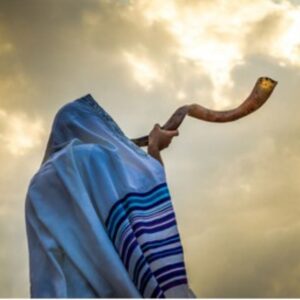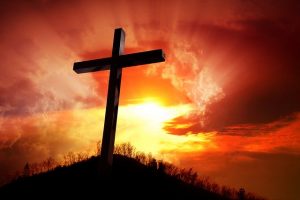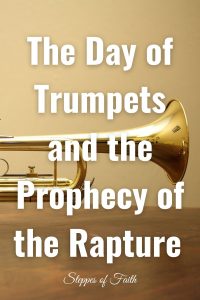
“Sound an alarm with the trumpets.” Numbers 10:9
Every September, the Jewish community comes together to celebrate Rosh HaShanah, meaning “head of the year.” It occurs on the first day of the month of Tishrei. As one of three High Holy Days on the Jewish calendar, many events surround this special day.
First, Rosh HaShanah signifies the beginning of a new year (the Jewish New Year’s Day) on which Jewish tradition bases the sabbatical and jubilee years (Leviticus 25:8-22). It is usually celebrated by abstaining from work, fasting, attending religious services, doing charitable works, and family get-togethers. The day also marks the beginning of Ten Days of Repentance and ends on Yom Kippur, the Day of Atonement.
Most importantly, Rosh HaShanah is alternately called the Day of Judgment and the Day of Trumpets, the purpose of which is not simply to celebrate a “new year.” Unbeknownst to many, it also points to the second coming of Jesus Christ.
Babylonian Influence
God’s designation of Rosh HaShanah (though it is not explicitly called as such) and all the Jewish biblical feasts are first found in the book of Leviticus.
“Then the LORD spoke to Moses, saying, ‘Speak to the children of Israel, saying: ‘In the seventh month, on the first day of the month, you shall have a sabbath-rest, a memorial of blowing trumpets, a holy convocation.’” Leviticus 23:23-24
Though the Jews celebrate Rosh HaShanah as the beginning of a new year, it is not the first day of the Jewish calendar. That occurs in the Spring in the month of Nisan (March-April), two weeks before Passover. Regardless, the Jews celebrate Rosh HaShanah as a new year because of rabbinic culture, which some attribute to the Jewish time of exile in Babylon.
The Babylonians happened to celebrate their new year during the seventh month of the Jewish calendar, which the Babylonians called Tishrei. In Akkadian (Babylonian language), Tishrei means “beginning.” This may be why the seventh month of the Jewish calendar is also called Tishrei and their celebration is called Rosh HaShanah, the “head of the year.”
Some may say Rosh HaShanah also appears in Ezekiel 40:1 and establishes it as a High Holy Day. However, the prophet Ezekiel is referring to the beginning of a year and not a holiday. It is likely he wrote this passage in the Spring at the time of Nisan, the actual first month of the Jewish calendar. It should also be noted that he wrote it twenty-five years into the Babylonian captivity, and so Babylonian influence can be expected.
For Orthodox Jews, Rosh HaShanah (Tishrei 1) is not about celebrating a new year but as the time when God created the world. Evidence does not exist to support this belief. Nevertheless, many serious Orthodox Jews celebrate Rosh HaShanah in commemoration of Genesis 1.
The Jewish Day of Trumpets
On Rosh HaShanah, the Jewish people blow a traditional shofar, a hollowed-out ram’s horn. It is typically blown 100 times throughout the day, even during worship services which are largely patterned after Passover prayers. Rabbinic tradition dictates the Israelites blew a shofar the day God gave the Torah to Moses on Mount Sinai, but this too is not based on Scripture.
Today, blowing a trumpet on Rosh HaShanah symbolizes a call to repentance, mourning over one’s sins, and rededication of one’s faith. Each has its own “call.” As a result, rabbinic tradition refers to the holiday as the Day of Trumpets, or Yom Hateruah, “a memorial of blowing trumpets,” as mentioned in Leviticus 23.
[Click Here to Hear the Different Shofar Sounds and Learn More About Them]
Trumpets are not only commanded on Rosh HaShanah. God also commands it in the book of Numbers as a form of communication.

Trumpet Protocol
“And the LORD spoke to Moses, saying, ‘Make two silver trumpets for yourself. You shall make them of hammered work.” Numbers 10:1-2
God commanded Moses to forge two silver trumpets for two specific purposes—to call the Israelite camp together and direct their movements when the priests sent them out. The priests blew the trumpets a precise way according to each unique instruction.
Blowing both trumpets with a long steady sound meant the congregation (all the adult males) should gather at the door of the tabernacle of meeting. But if the priests only blew one horn, only the leaders of the tribes should gather (v4).
Conversely, when it was time for the Israelites to continue their journey in the wilderness, the priests blew the trumpet three short times to signal the tribes on the east side of the camp (Judah, Issachar, and Zebulun) to move. A second trumpet blast signaled the tribes on the south side (Reuben, Simeon, and Gad) to move (v5-6).
The priests also blew the trumpets at the beginning of each month as well as over their burnt and peace offerings as a memorial to God (v10). And when it was time for war, the trumpets were blown as an alarm, in which case God made a unique promise.
“When you go to war in the land against the enemy who oppresses you, then you shall sound an alarm with the trumpets, and you will be remembered before the LORD your God, and you will be saved from your enemies.” Numbers 10:9
God promised the Israelites He would remember them and save them from their enemies when they blew the trumpets. Numbers 10 ties back into Leviticus 23 and Rosh HaShanah, the Day of Trumpeting. And like all Jewish holiday feasts, it also points to Jesus.
Sending Out the Armies
Recall that Numbers 10 commands the priests to blow a trumpet both to gather the people and to send them out. In the last days—and many people speculate on Rosh HaShanah—the trumpet will sound again. At that time, the Lord Jesus will stand on the Mount of Olives and send out the heavenly armies comprised of both angels and “holy ones,” believers who were raptured and return with Him to conquer the antichrist and save Israel.
“We shall not all sleep, but we shall all be changed—in a moment, in the twinkling of an eye, at the last trumpet. For the trumpet will sound, and the dead will be raised incorruptible, and we shall be changed.” 1 Corinthians 15:51-52
“And the armies in heaven, clothed in fine linen, white and clean, followed Him on white horses.” Revelation 19:14
“Thus, the LORD my God will come and all the saints with You.” Zechariah 14:5
“Then the LORD will go forth and fight against those nations as He fights in the day of battle. And in that day, His feet will stand on the Mount of Olives, which faces Jerusalem on the east, and the Mount of Olives shall be split in two, from east to west, making a very large valley. Half of the mountain shall move toward the north and half of it toward the south.” Zechariah 14:3-4
When we blow the trumpet, we call the people to gather. Likewise, we call out to the Lord to send out His armies and save us (Numbers 10:9). For now, we blow the trumpet in expectation and anticipation for Jesus’ glorious return.

Joel’s Prophecy
Many biblical prophecies, including in the book of Joel, foretell events that will occur during the end times. Joel’s prophecy is especially jarring.
“Blow the trumpet in Zion and sound an alarm in My holy mountain! Let all the inhabitants of the land tremble, for the Day of the LORD is coming, for it is at hand: a day of darkness and gloominess; a day of clouds and thick darkness like the morning clouds spread over the mountains. A people come, great and strong, the like of whom has never been, nor will there ever be any such after them, even for many successive generations.” Joel 2:1-2
The prophet describes an enormous swarm of locusts that will descend on Judah in the last days as a direct judgment from God (see also the Fifth Trumpet Judgment in Revelation 9:1-11). While he foretells a literal invasion of giant locusts, the illustration of locusts also conveys misery and catastrophe, a common expression in the Old Testament.
Notice the specific command to “blow the trumpet.” Later in verse 15, God again commands the people to “blow the trumpet in Zion” and to fast and pray. Verse 18 then promises God will be zealous for His land and take pity on His people. By the end of the book of Joel, God pours out His spirit and blesses His people.
But God will only save the people if they first “blow a trumpet” and call out to Him.
New Testament Trumpets
Blowing trumpets is also mentioned several times in the New Testament, and they all point to Jesus’ return for His people.
“And He will send His angels with a great sound of a trumpet, and they will gather together His elect from the four winds, from one end of heaven to the other.” (Matthew 24:31)
“We shall not all sleep, but we shall all be changed—in a moment, in the twinkling of an eye, at the last trumpet. For the trumpet will sound, and the dead will be raised incorruptible, and we shall be changed.” (1 Corinthians 15:51-52)
“For the Lord Himself will descend from heaven with a shout, with the voice of an archangel, and with the trumpet of God. And the dead in Christ will rise first. Then we who are alive and remain shall be caught up together with them in the clouds to meet the Lord in the air. And thus we hall always be with the Lord.” (1 Thessalonians 4:16-17)
Paul prophesies that the coming rapture of the saints will occur at the last trumpet. Revelation 11 confirms this prophecy, when the seventh and last trumpet from heaven will be sounded.
“Then the seventh angel sounded [his trumpet], and there were loud voices in heaven saying, ‘The kingdoms of this world have become the kingdoms of our Lord and of His Christ, and He shall reign forever and ever!’” (Revelation 11:15, with addition)
The seventh and last trumpet sound will usher in Jesus’ return, the second coming. At that time, He will defeat His enemies, including Satan, and establish His messianic kingdom to rule forever.

At the Midnight Cry
Blowing a trumpet is a traditional part of Rosh HaShanah. It is not only a call to pray, repent, and study God’s word but also a cry for God to deliver and save us from our enemies. As believers in Christ, we know Jesus’ blood shed on the cross covers our sin. We only need to blow our trumpet, i.e., cry out to Him for salvation and receive His gift of abundant, overflowing grace.
We can also look forward to the day when a heavenly trumpet will sound, and the Lord will send out His heavenly armies to save many from the clutches of evil and bring them into His kingdom. It may occur on Rosh HaShanah, or it may not. Jesus says not even He knows the day or hour (Matthew 24:36). Either way, we must be ready to hear the last trumpet and see Jesus coming with the clouds (Mark 13:26; Revelation 1:7). Those who are not will unfortunately suffer severe consequences.
